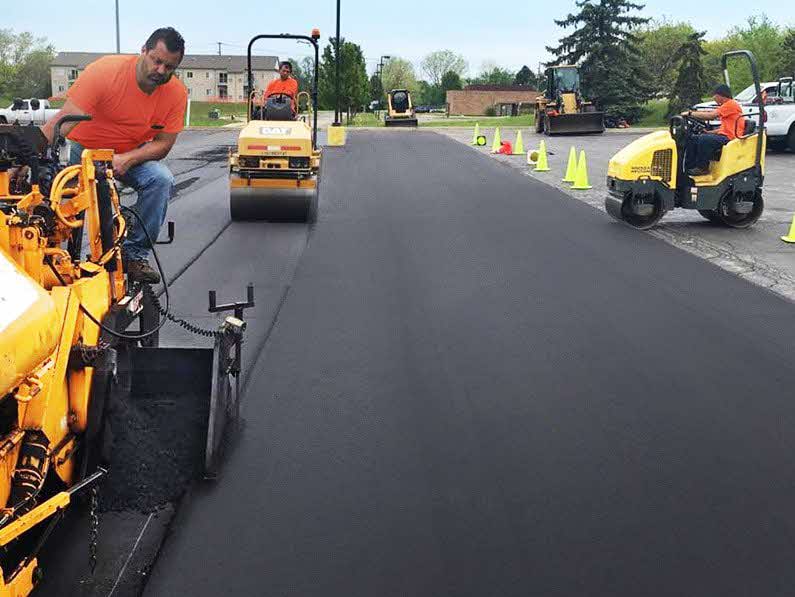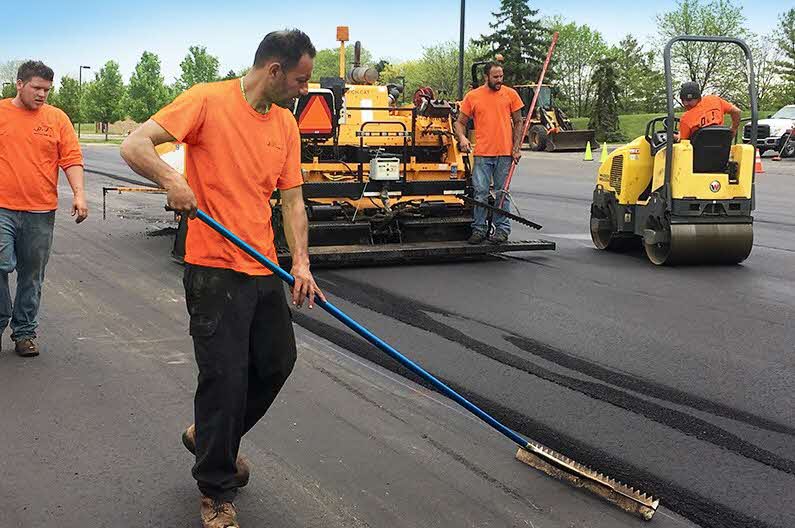Asphalt Paving Preston Corners Michigan
We Are Locally Owned
& Operated For 36 Years
Contact Us Today!
About Asphalt Paving
Comprehensive Guide to Asphalt Paving for Commercial Properties
When it comes to durable, high-quality, and resilient paving solutions for commercial properties, asphalt paving reigns supreme. Not only does it provide unmatched aesthetic appeal, but its functionality and long-term benefits are unparalleled. Whether you’re a property owner seeking asphalt paving or a project manager researching the best options, this comprehensive guide will explain the entire process, benefits, and at the same time, provide insights on selecting the best asphalt paving contractors.
Why Choose Asphalt Paving?
Asphalt, often referred to as bitumen, is a robust, resilient, semi-solid form of petroleum. It’s the most popular choice for commercial properties, and for good reason. It’s eco-friendly, cost-effective, versatile, low-maintenance, and provides the best multi-year performance of any paving material. A suitable asphalt paving company can install a broad assortment of styles and finishes, offering a broad range of appearance options to suit every locale and purpose.
The Asphalt Paving Process
Understanding the asphalt pavings process helps to explain why it’s so beneficial. A professional asphalt paving contractor will typically start with site preparation, which includes removing existing surfaces, grading the ground, and preparing the subbase to ensure durability and stability. Next, a binder layer is applied on top of the subbase, followed by the asphalt layer. The asphalt is then compacted and smoothed out for a polished finish. An optional seal coating may be applied for increased longevity and appearance.
Asphalt Paving Costs and Considerations
The asphalt paving cost per sq ft depends on several factors, including the type of asphalt used, the complexity of the project, the ground’s condition, and of course, the location. It’s always recommended to obtain quotes from several asphalt paving companies near you to ensure you’re getting the best value. Also, for long-term cost savings, it’s wise to factor in the small, regular maintenance costs against hefty future replacement costs. Quality asphalt paving, when well-maintained, can last several decades.
Finding Quality Asphalt Paving Services
When researching “asphalt paving near me,” it’s crucial to ensure you’re selecting from reputable asphalt paving companies. High-quality asphalt paving contractors will have a solid reputation, trained and experienced staff, utilize excellent materials, and adhere to safety and construction guidelines. Remember, investing in quality asphalt paving services now can result in significant benefits and savings down the line.
Asphalt Paving vs. Other Materials
Compared to other paving materials, asphalt offers several unique benefits. Besides being cost-effective, asphalt paving is adaptable to temperature changes, making it less likely to crack or break in fluctuating weather conditions. Additionally, asphalt’s dark color absorbs and retains more heat, making it faster to melt snow and ice, a critical factor for properties in colder regions.
Residential vs. Commercial Asphalt Paving
While the basics of asphalt paving apply to both commercial applications, there are differences. Commercial asphalt paving often requires stronger materials to withstand heavy traffic, and the application process may be more complex due to larger project sizes. Regardless, both commercial property owners can enjoy the long-lasting benefits of a well-executed asphalt paving job.
In summary
Asphalt paving remains the top choice for commercial property owners worldwide. From its initial cost advantages to its resilience and longevity, the benefits are abundant. As a commercial property owner or manager, knowing the intricacies of asphalt paving helps make informed, cost-effective decisions. Remember, the key to a successful, long-term asphalt surface is initially choosing a reputable contractor.
Ensure your commercial property reflects the professionalism you operate with and adds value to its surroundings with a high-quality asphalt parking lot or driveway. For your next asphalt paving project, please reach out to our experienced and professional team that ensures quality at every stage of the process.
Contact Us Today for a FREE
Asphalt Paving Quote






About Preston Corners, Michigan
History
Shelby Township was set off by an act of the Michigan Territorial Legislature on April 12, 1827, and a civil government was organized the following May. It originally included the area that is now Sterling Heights, which was set off March 17, 1835, as the township of Jefferson, renamed to Sterling on March 6, 1838. Utica, located on the southern edge of the township, originally incorporated as a village on March 9, 1838, although that corporation was dissolved soon afterwards. The village was incorporated for a second time on May 10, 1877.
The village of Disco (42°41′02″N 83°02′04″W / 42.68389°N 83.03444°W) was located at what is now the junction of 24 Mile Road and Van Dyke Road. and was platted in 1849. The community never incorporated, although the local high school, the Disco Academy, gained some local recognition and a post office named Disco operated from May 5, 1854, until July 31, 1906. Only a few homes and a namesake on old county road maps remain of this now forgotten historic place. See also: “The Lost Village of Disco” on the Shelby Township Historical Society website.
Geography
Shelby Township is in western Macomb County and is bordered to the west by the cities of Rochester and Rochester Hills in Oakland County. The cities of Utica and Sterling Heights border the township to the south. Mount Clemens, the Macomb county seat, is 11 miles (18 km) to the southeast, and downtown Detroit is 24 miles (39 km) to the south.
According to the United States Census Bureau, the township has a total area of 35.2 square miles (91 km), of which 34.4 square miles (89 km2) are land and 0.8 square miles (2.1 km), or 2.31%, are water. The township is drained by the Clinton River, a tributary of Lake St. Clair.
Neighboring communities:
Communities
There are no incorporated villages and four unincorporated communities:
- Preston Corners is located at the corner of 25 Mile and Schoenherr roads at 42°41′58″N 82°59′45″W / 42.69944°N 82.99583°W. Ira and Deborah Preston bought 400 acres (1.6 km2) of land from the United States government in 1826 and settled on it the following year, later building a sawmill and a picket fence factory.
- Shelby is located at Shelby and 25 Mile Roads (42°41′51″N 83°04′10″W / 42.69750°N 83.06944°W).
- Shelby Village is located where Auburn and Ryan roads intersect. Housing was built in this area in the 1940s.
- Yates is on the boundary with Rochester and Rochester Hills, Oakland County (42°40′25″N 83°05′45″W / 42.67361°N 83.09583°W ; Elevation: 669 ft./204 m.).
Demographics
As of the census of 2010, there were 73,804 people, 28,299 households, and 17,923 families living in the township. The racial makeup of the township was 89.4% White, 3.1% African American, 3.3% Asian, 0.3% from other races, and 1.5% from two or more races. Hispanic or Latino of any race were 2.4% of the population.
The U.S. Census Bureau defined Shelby Charter Township as a census-designated place (CDP) in the 2000 Census so that the community would appear on the list of places (like cities and villages) as well on the list of county subdivisions (like other townships). The final statistics for the township and the CDP were identical. As of the census of 2000, there were 65,159 people, 24,486 households, and 17,923 families living in the township. The population density was 1,878.7 inhabitants per square mile (725.4/km2). There were 25,265 housing units at an average density of 728.5 per square mile (281.3/km). The racial makeup of the township was 94.95% White, 0.85% African American, 0.24% Native American, 2.11% Asian, 0.02% Pacific Islander, 0.45% from other races, and 1.38% from two or more races. Hispanic or Latino of any race were 1.71% of the population.
There were 24,486 households, out of which 33.7% had children under the age of 18 living with them, 62.6% were married couples living together, 7.3% had a female householder with no husband present, and 26.8% were non-families. 21.6% of all households were made up of individuals, and 6.6% had someone living alone who was 65 years of age or older. The average household size was 2.65 and the average family size was 3.13.
In the township the population dispersal was 24.9% under the age of 18, 8.5% from 18 to 24, 31.0% from 25 to 44, 25.1% from 45 to 64, and 10.5% who were 65 years of age or older. The median age was 37 years. For every 100 females, there were 99.6 males. For every 100 females age 18 and over, there were 97.7 males.
The median income for a household in the township was $65,291, and the median income for a family was $76,312. Males had a median income of $59,380 versus $33,844 for females. The per capita income for the township was $30,131. About 2.7% of families and 3.7% of the population were below the poverty line, including 4.1% of those under age 18 and 5.1% of those age 65 or over.
Government
Shelby Charter Township has a Supervisor-Board style township government with elected supervisor, clerk, treasurer and four trustees. The Township operates the Shelby Township Library as well as Cherry Creek Golf Course.
Education
The majority of residents are zoned into Utica Community Schools, which serves parts of the communities of Sterling Heights, Macomb Township, Washington Township, and Ray Township, as well as most of Shelby Charter Township, and all of Utica. However, a small number of residents are zoned into Romeo Community Schools.
Contact Us Today for a FREE
Asphalt Paving Quote
Our Asphalt Paving services are available in Preston Corners as well as all of Macomb County.
Our dedicated team at D&J Contracting Inc is at-the-ready to provide you with great customer service and first class Asphalt Paving services. Reach out to us at (586) 954-0008 to discuss your Asphalt Paving needs today!